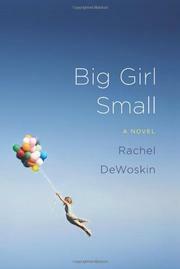You need to sign in or sign up before continuing.
Take a photo of a barcode or cover
I liked this book. At least most of it. The beginning was intriguing, with hints of a scandal to come. Somehow, after the truth came out, the novel lost steam and the ending seemed to nicely wrapped up, considering the subject matter.
It was good until the climax when the big scandal was revealed. After that I only finished it because I was so far through it wasn't worth Turning it off (i listened on audio.) The scandal was kind of lame and geared more towards high schoolers today than the adults the book was written for.
The protagonist is 17 year old Judy Lohden, who has been accepted into a fancy performing arts high school, and also happens to be a dwarf. When we meet her, she's hiding out because something terrible has happened. We spend the story reading about her recent past, how she should have realized how good she had it, and how her life is completely ruined now.
Enjoyed this Alex award winner. Loved the voice of the main character, Judy, a "little person" trying to survive her high school years and life in general. Graphic content makes this an adult book, but older teens will appreciate Judy's plight. Would pair well with Catcher in the Rye - lots of similar themes.
I just want to start off by saying that I don't normally rate books below three stars. However, because I've decided not to recommend this book to anyone, I think any rating above two would be inappropriate.
Big Girl Small follows 11th grader Judy, who has Achondroplasia (Dwarfism). As someone who's tried to broaden their horizons by reading books featuring disabilities, other races, and more, I was naturally a little excited to read this. To be honest, the author does a great job with writing Judy's voice. She definitely gives her a unique personality. However, it became clear, more toward the end, that this story holds a lot of problematic themes.
Let's forget for a second that Judy has Achondroplasia, a disability that the author, as far as my own research goes, has little to no experience with. What's more of an issue is how the author dealt with the topic of sexual assault. This is a highly sensitive topic—a very HOT topic—and did not go in the direction that I feel readers—especially those who have dealt with sexual assault—NEED. I don't want to assume anything about the author when it comes to this topic, but I feel she handled this part of Judy's story problematically. To work backward from the end, Judy does not feel the need to seek help and is adamant that she not see a therapist or psychiatrist after her trauma. This, unfortunately, sends the message to readers that therapy is unhelpful and unnecessary. Second, Judy makes a big deal about not wanting to "ruin anyone's lives." As a CSA survivor myself, I completely understand this way of thinking. However, if one is going to write a book dealing with this topic and send it out into the public, it's incredibly wise to have other characters, especially adults like her parents and teachers, push for some kind of bigger punishment than a simple apology letter. The thing is, Judy is wrong. She's an unreliable narrator in this sense. To end the book with no greater punishment for the boys who assaulted her, along with strengthening the idea that it would be of no use, is sending a huge message to survivors—one that strengthens their fears and puts others in danger.
Big Girl Small follows 11th grader Judy, who has Achondroplasia (Dwarfism). As someone who's tried to broaden their horizons by reading books featuring disabilities, other races, and more, I was naturally a little excited to read this. To be honest, the author does a great job with writing Judy's voice. She definitely gives her a unique personality. However, it became clear, more toward the end, that this story holds a lot of problematic themes.
Let's forget for a second that Judy has Achondroplasia, a disability that the author, as far as my own research goes, has little to no experience with. What's more of an issue is how the author dealt with the topic of sexual assault. This is a highly sensitive topic—a very HOT topic—and did not go in the direction that I feel readers—especially those who have dealt with sexual assault—NEED. I don't want to assume anything about the author when it comes to this topic, but I feel she handled this part of Judy's story problematically. To work backward from the end, Judy does not feel the need to seek help and is adamant that she not see a therapist or psychiatrist after her trauma. This, unfortunately, sends the message to readers that therapy is unhelpful and unnecessary. Second, Judy makes a big deal about not wanting to "ruin anyone's lives." As a CSA survivor myself, I completely understand this way of thinking. However, if one is going to write a book dealing with this topic and send it out into the public, it's incredibly wise to have other characters, especially adults like her parents and teachers, push for some kind of bigger punishment than a simple apology letter. The thing is, Judy is wrong. She's an unreliable narrator in this sense. To end the book with no greater punishment for the boys who assaulted her, along with strengthening the idea that it would be of no use, is sending a huge message to survivors—one that strengthens their fears and puts others in danger.
would have been two stars but the last 1/3 redeemed it slightly. more like 2.5.
Not the best. Interesting concept-different from so many teen novels, I can't remember the last time I read about a teen dwarf, but really hard to follow and get into. It all comes together in the end, but a little far fetched in many aspects. I love the great parents, though. It's nice to see a not-so-perfect family come together.
I have a feeling I would've liked this more if I'd read it rather than listen to it on audio...



